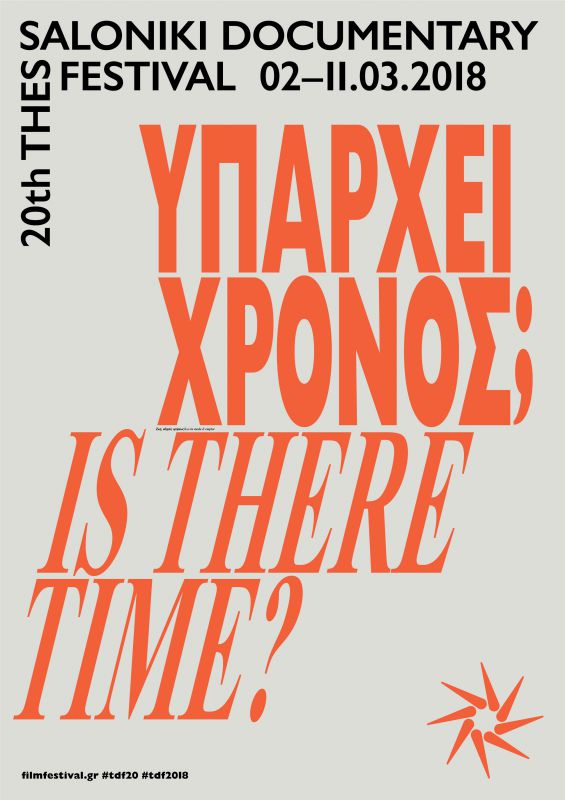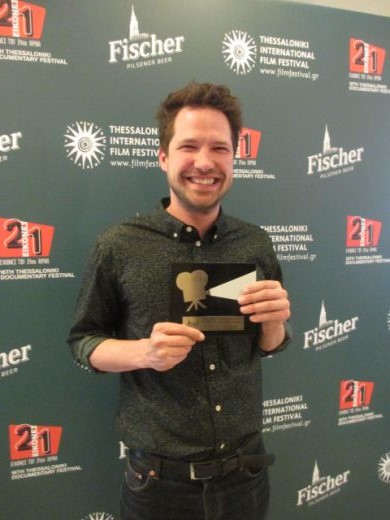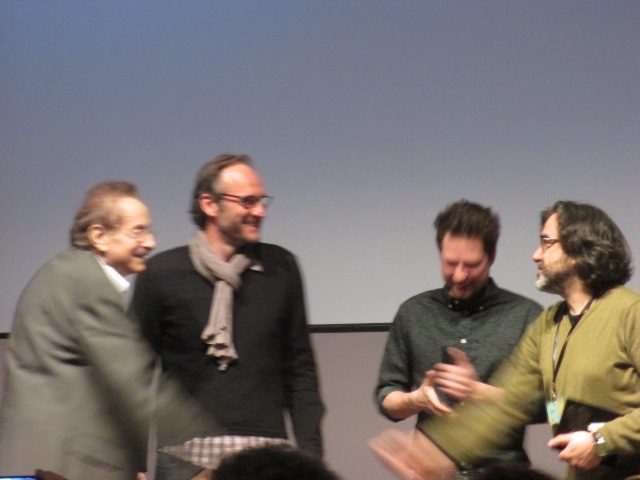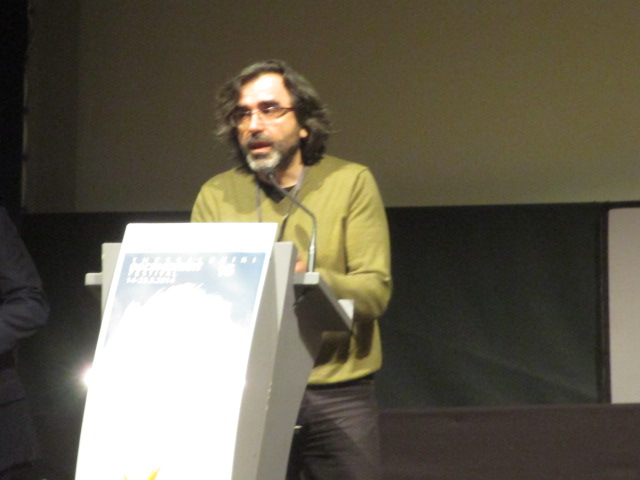 Directors Mouna B. Stewart (It's Better To Jump), Matthew Pond (The Life and Crimes of Doris Payne), Tonislav Hristov (Soul Food Stories) and Karin Ekberg (A Separation) gave a press conference on Saturday, 22 March 2014, in the context of the 16th Thessaloniki Documentary Festival.
Directors Mouna B. Stewart (It's Better To Jump), Matthew Pond (The Life and Crimes of Doris Payne), Tonislav Hristov (Soul Food Stories) and Karin Ekberg (A Separation) gave a press conference on Saturday, 22 March 2014, in the context of the 16th Thessaloniki Documentary Festival.
The Life and Crimes of Doris Payne is a film about Doris Payne, a poor, single African-American mother living in the US in the 1950s, who became one of the most notorious jewel thieves of all time. Director Matthew Pond (he co-directed with Kirk Marcolina) said about the film: “I first read about Payne in the newspapers, and her story inspired me to make this documentary. I visited Payne in prison and for months we would meet every week. We eventually became friends. When she was released from prison, we followed her with our camera for a year. At some point she was tried for the theft of a diamond in San Diego, and our film crew was there to cover the trial.” According to the director, one of the most interesting things about Doris Payne is her talent in disguising herself: “By changing her clothes and make-up, she could turn into an entirely different person”. Pond said that the reason they decided to make the documentary was because it had the qualities of “a feelgood mystery film, with lots of guns and blood. This woman was born at a time when American society was racially segregated, and found herself in Europe, where her notoriety gave her the chance to socialize with Monte Carlo millionaires. But she is also a professional thief, and this duality of her personality intrigued me.”
 Karin Ekberg's A Separation is a personal film about the divorce of her parents. The film blends tragic and comic elements to portray the last days of a long marriage. “No one could make this film the same way I did,” Ekberg explained, adding: “The fact that I was both the filmmaker and the daughter of the protagonists made all the difference. In the beginning, no one realized I was making a film. Not that I deceived anyone. I visited them one day and learned that my mother wanted a divorce, after 38 years of marriage. I also found out that my parents would be leaving from the house we had been living for years in three months time. During those three months I realized that each home is a melancholic mess. I tried to capture this chaos with my camera, by opening the closets, searching the attic, discovering baby clothes from ages ago. I kept filming after the three months were over, when my parents moved to separate houses, and I was observing their new lives. A year later, when I saw the material, I knew I had to turn it into a film.” Ekberg said that although her film is about the end of a relationship, it is not sad. “There is a happy end, with both protagonists starting a new life. In the end, they seem rejuvenated and pursuing new interests,” she said, adding: “In the end, I believe my film is not about how you find love, but how you find yourself.”
Karin Ekberg's A Separation is a personal film about the divorce of her parents. The film blends tragic and comic elements to portray the last days of a long marriage. “No one could make this film the same way I did,” Ekberg explained, adding: “The fact that I was both the filmmaker and the daughter of the protagonists made all the difference. In the beginning, no one realized I was making a film. Not that I deceived anyone. I visited them one day and learned that my mother wanted a divorce, after 38 years of marriage. I also found out that my parents would be leaving from the house we had been living for years in three months time. During those three months I realized that each home is a melancholic mess. I tried to capture this chaos with my camera, by opening the closets, searching the attic, discovering baby clothes from ages ago. I kept filming after the three months were over, when my parents moved to separate houses, and I was observing their new lives. A year later, when I saw the material, I knew I had to turn it into a film.” Ekberg said that although her film is about the end of a relationship, it is not sad. “There is a happy end, with both protagonists starting a new life. In the end, they seem rejuvenated and pursuing new interests,” she said, adding: “In the end, I believe my film is not about how you find love, but how you find yourself.”
 It's Better To Jump, co-directed by Gina M. Angelone, Patrick Alexander Stewart and Mouna B. Stewart, takes the audience on a journey to a different part of the world, the city of Akka in the northern Israeli coast. Stewart said about the film: “The city of Akka has many unique characteristics, including a mixed population of Arabs, Muslims, Christians and Jews. We had visited Akka on a family vacation and we were impressed so much with it, that we decided to make the film. We collected a lot of diverse material, but we decided to focus on the local Arab minority, who are economically and educationally disadvantaged compared to the Jews. Akka has a lively art community, its people are open, hospitable, and willing to open their doors and talk to you, and we wanted to convey this with our film.” The changing economic and social conditions are forcing the Arabs to leave Akka. “I believe that this dislocation is not accidental, but deliberate. No one admits it openly, but the people there are under pressure to abandon the city. The Arabs are poor, have no money to pay their bills, so when they are approached by potential buyers of their homes, what other choice is there but accept and leave?” One of the most beautiful parts of Akka are its old city walls, stretching above the sea. Many local children jump to the sea from those walls. “We included those jumps in our film to show the tenacity of the local people, who go on living without losing hope, despite all their problems,” said Stewart.
It's Better To Jump, co-directed by Gina M. Angelone, Patrick Alexander Stewart and Mouna B. Stewart, takes the audience on a journey to a different part of the world, the city of Akka in the northern Israeli coast. Stewart said about the film: “The city of Akka has many unique characteristics, including a mixed population of Arabs, Muslims, Christians and Jews. We had visited Akka on a family vacation and we were impressed so much with it, that we decided to make the film. We collected a lot of diverse material, but we decided to focus on the local Arab minority, who are economically and educationally disadvantaged compared to the Jews. Akka has a lively art community, its people are open, hospitable, and willing to open their doors and talk to you, and we wanted to convey this with our film.” The changing economic and social conditions are forcing the Arabs to leave Akka. “I believe that this dislocation is not accidental, but deliberate. No one admits it openly, but the people there are under pressure to abandon the city. The Arabs are poor, have no money to pay their bills, so when they are approached by potential buyers of their homes, what other choice is there but accept and leave?” One of the most beautiful parts of Akka are its old city walls, stretching above the sea. Many local children jump to the sea from those walls. “We included those jumps in our film to show the tenacity of the local people, who go on living without losing hope, despite all their problems,” said Stewart.
 Tonislav Hristov's Soul Food Stories takes place in the Bulgarian village of Satovcha. In this small community, many different religious and ethnical groups coexist in peace: Orthodox Bulgarians, Muslim Turks, Pomacs and Evangelist Gypsies. People were divided by a past full of conflicts, but now they have found a simple way to come close to each other: Food. Bulgarian director Tonislav Hristov, who has been living in Finland for many years, explained the importance of food as the link connecting people from such diverse backgrounds. “Food is connected to my Bulgarian roots. My grandparents lived to be eighty by eating mostly yoghurt and cheese, which are also popular in Greece. My film has three major themes: the history of communism and conflicts, the present and the future, as the villagers are worried about the young ones leaving the country. My intention is to show the world that these developments are leading to the desolation of the village.” The harmonious coexistence of the villagers is a very powerful element in the film, said Hristov, adding: “I believe this scheme can cross the Bulgarian border and become a social paradigm everywhere, for a better future,” he said. Filming lasted three weeks, a period that literally changed the director: “I gained eight kilos from overeating, it was simply madness,” he said.
Tonislav Hristov's Soul Food Stories takes place in the Bulgarian village of Satovcha. In this small community, many different religious and ethnical groups coexist in peace: Orthodox Bulgarians, Muslim Turks, Pomacs and Evangelist Gypsies. People were divided by a past full of conflicts, but now they have found a simple way to come close to each other: Food. Bulgarian director Tonislav Hristov, who has been living in Finland for many years, explained the importance of food as the link connecting people from such diverse backgrounds. “Food is connected to my Bulgarian roots. My grandparents lived to be eighty by eating mostly yoghurt and cheese, which are also popular in Greece. My film has three major themes: the history of communism and conflicts, the present and the future, as the villagers are worried about the young ones leaving the country. My intention is to show the world that these developments are leading to the desolation of the village.” The harmonious coexistence of the villagers is a very powerful element in the film, said Hristov, adding: “I believe this scheme can cross the Bulgarian border and become a social paradigm everywhere, for a better future,” he said. Filming lasted three weeks, a period that literally changed the director: “I gained eight kilos from overeating, it was simply madness,” he said.
-16TH TDF PRESS RELEASE-
Edited by Vanessa McMahon
 Mcmahon Vanessa
Mcmahon Vanessa 

















 Directors Mouna B. Stewart (It's Better To Jump), Matthew Pond (The Life and Crimes of Doris Payne), Tonislav Hristov (Soul Food Stories) and Karin Ekberg (A Separation) gave a press conference on Saturday, 22 March 2014, in the context of the 16th Thessaloniki Documentary Festival.
Directors Mouna B. Stewart (It's Better To Jump), Matthew Pond (The Life and Crimes of Doris Payne), Tonislav Hristov (Soul Food Stories) and Karin Ekberg (A Separation) gave a press conference on Saturday, 22 March 2014, in the context of the 16th Thessaloniki Documentary Festival. Karin Ekberg's A Separation is a personal film about the divorce of her parents. The film blends tragic and comic elements to portray the last days of a long marriage. “No one could make this film the same way I did,” Ekberg explained, adding: “The fact that I was both the filmmaker and the daughter of the protagonists made all the difference. In the beginning, no one realized I was making a film. Not that I deceived anyone. I visited them one day and learned that my mother wanted a divorce, after 38 years of marriage. I also found out that my parents would be leaving from the house we had been living for years in three months time. During those three months I realized that each home is a melancholic mess. I tried to capture this chaos with my camera, by opening the closets, searching the attic, discovering baby clothes from ages ago. I kept filming after the three months were over, when my parents moved to separate houses, and I was observing their new lives. A year later, when I saw the material, I knew I had to turn it into a film.” Ekberg said that although her film is about the end of a relationship, it is not sad. “There is a happy end, with both protagonists starting a new life. In the end, they seem rejuvenated and pursuing new interests,” she said, adding: “In the end, I believe my film is not about how you find love, but how you find yourself.”
Karin Ekberg's A Separation is a personal film about the divorce of her parents. The film blends tragic and comic elements to portray the last days of a long marriage. “No one could make this film the same way I did,” Ekberg explained, adding: “The fact that I was both the filmmaker and the daughter of the protagonists made all the difference. In the beginning, no one realized I was making a film. Not that I deceived anyone. I visited them one day and learned that my mother wanted a divorce, after 38 years of marriage. I also found out that my parents would be leaving from the house we had been living for years in three months time. During those three months I realized that each home is a melancholic mess. I tried to capture this chaos with my camera, by opening the closets, searching the attic, discovering baby clothes from ages ago. I kept filming after the three months were over, when my parents moved to separate houses, and I was observing their new lives. A year later, when I saw the material, I knew I had to turn it into a film.” Ekberg said that although her film is about the end of a relationship, it is not sad. “There is a happy end, with both protagonists starting a new life. In the end, they seem rejuvenated and pursuing new interests,” she said, adding: “In the end, I believe my film is not about how you find love, but how you find yourself.” It's Better To Jump, co-directed by Gina M. Angelone, Patrick Alexander Stewart and Mouna B. Stewart, takes the audience on a journey to a different part of the world, the city of Akka in the northern Israeli coast. Stewart said about the film: “The city of Akka has many unique characteristics, including a mixed population of Arabs, Muslims, Christians and Jews. We had visited Akka on a family vacation and we were impressed so much with it, that we decided to make the film. We collected a lot of diverse material, but we decided to focus on the local Arab minority, who are economically and educationally disadvantaged compared to the Jews. Akka has a lively art community, its people are open, hospitable, and willing to open their doors and talk to you, and we wanted to convey this with our film.” The changing economic and social conditions are forcing the Arabs to leave Akka. “I believe that this dislocation is not accidental, but deliberate. No one admits it openly, but the people there are under pressure to abandon the city. The Arabs are poor, have no money to pay their bills, so when they are approached by potential buyers of their homes, what other choice is there but accept and leave?” One of the most beautiful parts of Akka are its old city walls, stretching above the sea. Many local children jump to the sea from those walls. “We included those jumps in our film to show the tenacity of the local people, who go on living without losing hope, despite all their problems,” said Stewart.
It's Better To Jump, co-directed by Gina M. Angelone, Patrick Alexander Stewart and Mouna B. Stewart, takes the audience on a journey to a different part of the world, the city of Akka in the northern Israeli coast. Stewart said about the film: “The city of Akka has many unique characteristics, including a mixed population of Arabs, Muslims, Christians and Jews. We had visited Akka on a family vacation and we were impressed so much with it, that we decided to make the film. We collected a lot of diverse material, but we decided to focus on the local Arab minority, who are economically and educationally disadvantaged compared to the Jews. Akka has a lively art community, its people are open, hospitable, and willing to open their doors and talk to you, and we wanted to convey this with our film.” The changing economic and social conditions are forcing the Arabs to leave Akka. “I believe that this dislocation is not accidental, but deliberate. No one admits it openly, but the people there are under pressure to abandon the city. The Arabs are poor, have no money to pay their bills, so when they are approached by potential buyers of their homes, what other choice is there but accept and leave?” One of the most beautiful parts of Akka are its old city walls, stretching above the sea. Many local children jump to the sea from those walls. “We included those jumps in our film to show the tenacity of the local people, who go on living without losing hope, despite all their problems,” said Stewart. Tonislav Hristov's Soul Food Stories takes place in the Bulgarian village of Satovcha. In this small community, many different religious and ethnical groups coexist in peace: Orthodox Bulgarians, Muslim Turks, Pomacs and Evangelist Gypsies. People were divided by a past full of conflicts, but now they have found a simple way to come close to each other: Food. Bulgarian director Tonislav Hristov, who has been living in Finland for many years, explained the importance of food as the link connecting people from such diverse backgrounds. “Food is connected to my Bulgarian roots. My grandparents lived to be eighty by eating mostly yoghurt and cheese, which are also popular in Greece. My film has three major themes: the history of communism and conflicts, the present and the future, as the villagers are worried about the young ones leaving the country. My intention is to show the world that these developments are leading to the desolation of the village.” The harmonious coexistence of the villagers is a very powerful element in the film, said Hristov, adding: “I believe this scheme can cross the Bulgarian border and become a social paradigm everywhere, for a better future,” he said. Filming lasted three weeks, a period that literally changed the director: “I gained eight kilos from overeating, it was simply madness,” he said.
Tonislav Hristov's Soul Food Stories takes place in the Bulgarian village of Satovcha. In this small community, many different religious and ethnical groups coexist in peace: Orthodox Bulgarians, Muslim Turks, Pomacs and Evangelist Gypsies. People were divided by a past full of conflicts, but now they have found a simple way to come close to each other: Food. Bulgarian director Tonislav Hristov, who has been living in Finland for many years, explained the importance of food as the link connecting people from such diverse backgrounds. “Food is connected to my Bulgarian roots. My grandparents lived to be eighty by eating mostly yoghurt and cheese, which are also popular in Greece. My film has three major themes: the history of communism and conflicts, the present and the future, as the villagers are worried about the young ones leaving the country. My intention is to show the world that these developments are leading to the desolation of the village.” The harmonious coexistence of the villagers is a very powerful element in the film, said Hristov, adding: “I believe this scheme can cross the Bulgarian border and become a social paradigm everywhere, for a better future,” he said. Filming lasted three weeks, a period that literally changed the director: “I gained eight kilos from overeating, it was simply madness,” he said.









